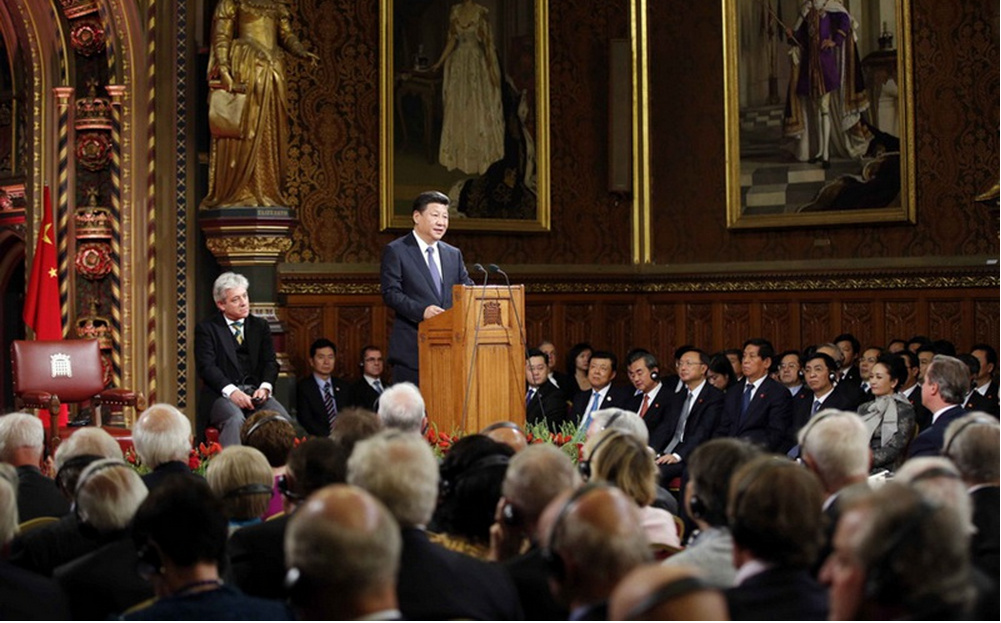Xi’s visit hailed as start of ‘golden era’ for China-UK ties

During his four-day state visit to the United Kingdom, President Xi Jinping delivers a speech at the UK Parliament on Oct. 20, stressing that China and the UK should enhance exchanges and mutual learning, boost mutual understanding, support and friendship between the two peoples, and promote bilateral cooperation to a new high.
LONDON—Chinese President Xi Jinping arrived in London on the evening of Oct. 19, kicking off the first state visit by a Chinese president to the United Kingdom in more than a decade. During the trip, President Xi attended a number of events, including meetings, banquets, summits and visits to schools and enterprises.
Mutual benefit
UK media has paid close attention to Xi’s state visit, and academics said the future of bilateral relations is promising. Some UK officials have said ties between the two countries are entering a “golden era.”
“This visit is meant to cement the signal that the UK is committed to helping China go global, and all of the meetings, all of the issues are connected with that goal,” Chatham House Director Robin Niblett said. Discussions on nuclear energy and high-speed rail will help facilitate the development of both countries’ infrastructure. Britain wants to show its openness to and support for China’s globalization because it will be mutually beneficial, Niblett said.
Bilateral cooperation
Recent years have seen steady growth in bilateral investment and trade. The UK has become the second-largest investor in China as well as China’s second-largest trading partner and investment destination within the European Union. Meanwhile, two-way investment between the two countries has been increasing rapidly.
Experts said trade and investment are essential to bilateral relations, and Xi’s visit is expected to facilitate growth.
“Economics comes first, second and third!” said Shaun Breslin, a professor of Politics and International Studies at the University of Warwick, who added that the UK government hopes to attract Chinese investment in a range of sectors and is open minded about investment destinations.
Rosemary Foot, a professor and senior research fellow in the Department of Politics and International Relations at Oxford, said that the priority for China-UK relations is business. UK companies hope to get more contracts that have something to do with China’s “the Belt and Road” initiative, while China’s ongoing process of urbanization means more opportunities for UK’s service sector. The UK government wants China’s investment in infrastructure, including nuclear power stations, and hopes to reinforce London’s status as an offshore trading center for the RMB. Concurrently, Chinese enterprises are looking for new opportunities abroad as well.
Niblett said finance and infrastructure investment in energy and transport are the key areas in bilateral relations. While the UK government currently prioritizes economic ties, they will not be the only priority if the bilateral relations are to remain strong in the long term. If it chooses to stay in the EU, the UK will hope to be a bridge between China and the EU. Although it will not be the only pivot, the UK will hope to enhance cooperation with China at a more global level. For example, the UK aims to forge partnerships on such issues as climate change, security, digital market and peacekeeping, Niblett said.
RMB internationalization
On Oct. 20, the People’s Bank of China (PBoC) issued 5 billion RMB in sovereign debt in London, with a term of one year and a rate of 3.1 percent. This marked the first time the PBoC has issued overseas debt in RMB.
Experts said London could be a key location for the internationalization of the RMB. With the rise of China’s economic and trade status, the RMB is playing an increasingly significant role in global economic activities. The UK hopes to consolidate London’s status as an offshore trading center and market for the RMB as a way to support its internationalization and construct a new mode of financial cooperation with mutual benefit.
Mark Boleat, chairman of the Policy and Resources Committee at the City of London Corporation, welcomes the issuance, arguing that this will help increase the “liquidity of London’s RMB bond market” and develop “a pricing benchmark.”
The offshore RMB bond market has seen steady growth along with the internationalization of the RMB, Boleat said. In 2014, the British government issued the first RMB-denominated sovereign bond and became the first Western government to do so. These are all important steps, and an offshore RMB market will further thrive with the development of China’s capital market and increase awareness among investors, he said.
“London will continue to support the Chinese authorities to promote two-way dialogue and market developments that will bring mutual benefit to the UK and China’s financial services,” Boleat said.
Jiang Hong and Hou Li are reporters at the Chinese Social Sciences Today.
